Spotlight on Alumni: Jeff Churchill
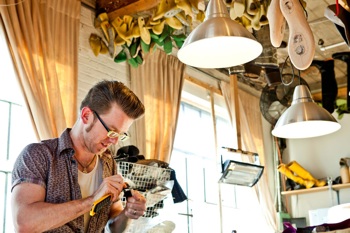 Jeff Churchill (photo: Connie Tsang)
Jeff Churchill (photo: Connie Tsang)Eight years ago, I started a company called Jitterbug Boy. We make custom footwear for the arts – theatre, film, tv, circus, dance, et cetera. Now, several years in, we’re a major player in these industries. I lead a team of 8 craftspeople and we supply shoes to productions all over the world – as far away as Macau, Tokyo, Sao Paolo, as well as shows across Europe and North America. I’ve had the chance to work on some pretty amazing projects over the years – including developing sub-aquatic acrobatic footwear for The House of Dancing Water in Macau and Le Rêve in Las Vegas, both for Dragone Productions in Belgium. Before starting Jitterbug Boy, I worked for Dragone for about a year – splitting time between Belgium and Las Vegas. I’ve worked on some pretty exciting film projects as of late as well – Mirror Mirror, Snow White & the Huntsman, the new Thor flick, Kick-Ass 2, the latest Fast & Furious film and the upcoming Guillermo del Toro film Pacific Rim. I’m about to start in on my 5th and 6th production of Priscilla Queen of the Desert the Musical, which is always fun…and challenging… It’s hard to pick favourites, really. Sort of like choosing your favourite kid, which I’m told is frowned upon.
I’ve made shoes for the likes of Julia Roberts, Armie Hammer, Vin Diesel, Chris Hemsworth, Criss Angel, Nathan Lane, Olga Kurylenko, Christopher Plummer, Kevin Pollack, Rinko Kikuchi, Teresa Palmer, David Strathairn and Siegfried & Roy.
How did you get into this field?
I’m pretty much self-taught as far as shoes go. When Lion King first came to Toronto – must be close to 15 years ago now – they were looking for a shoe coordinator. I was taking a bit of a break from theatre and working on a farm. I got a call out of the blue seeing if I’d be interested doing the shoe gig – the woman setting up the wardrobe knew I had props and wardrobe skills and thought I should give it a shot. I was surprised as anyone when I fell in love with shoes. There was a shoemaker from Stratford that would come in from time to time and show me the basics. I spent a lot of time just playing around and within a year I was making shoes myself. After leaving Mirvish, I spent a couple seasons at Stratford and had my own studio to mess around in. Then ran off to join the circus for a couple years (literally – I was Head of Wardrobe for Cirque du Soleil’s Alegria) before returning to the realm of shoes and the trial by fire that was Dragone Productions. I’ve had no formal training. In a lot of ways I view that as an asset – it’s easier to push limits when you don’t know where the limits are supposed to be.
 What was the most valuable thing you learned while studying in Theatre at York? What was the most challenging aspect or experience of training/studying at York?
What was the most valuable thing you learned while studying in Theatre at York? What was the most challenging aspect or experience of training/studying at York?
While at York, I made sure that I was actively working in the Toronto theatre scene as well. Partially because I needed the money, but mostly just to be active in the scene. It was a challenge – and totally exhausting – but I’m so glad I did it. As a result, I wasn’t able to get my degree in the usual 4 years (in fact, I think it took me about 13….) but I haven’t stopped working at all since leaving York in ‘97. I don’t regret it at all.
What is your fondest memory of studying Theatre at York? What was your favourite place at York, and why?
The Ab. For obvious reasons.
What was one thing you enjoyed about York that was outside of the Theatre? What did you do for the first summer out of the program?
I was offered a job as Assistant Head of Wardrobe at the Blyth Festival by another York grad – Jen Triemstra. I was actually applying for a carpentry position there, but Jen saw my resume and wanted to bring me in. It was my first wardrobe gig – I did way more carpentry, props and tech work back then. From there, I went to the Canadian Opera Company for a couple seasons, also in wardrobe.
 Do you have any advice or tips for York students just entering the dept.?
Do you have any advice or tips for York students just entering the dept.?
Get as much experience as you can in every aspect possible. Don’t limit yourself. If you’re a wardrobe person – learn about electrics. When time allows, work on a show downtown. Expose yourself to all the gigs you can – it will help you in any discipline in the end and you might surprise yourself. I would never in a million years imagined that I would become a shoemaker. I entered York thinking I would be a Lighting Designer. I left thinking I’d be a Set Designer. I’ve worked as an electrician, carpenter, sound man, truck driver, stage carpenter, props builder, technical director, dresser, head of wardrobe, etc etc etc. They all have helped me lead to where I am right now. And I have a hell of a lot of respect for all those gigs now.
Do you have any advice or tips for York students just about to graduate? about to join the job market?
It’s not an easy time for theatre in Canada or anywhere in the world. You’re going to have to work for it. And you’re going to have to do some crap jobs and work your way up. No one is going to hand you anything on a silver platter. Never be afraid to ask questions. Nobody is going to expect you to know everything – so don’t pretend you do. There are some incredibly talented people working in the Canadian theatre industry. Put your ego aside and learn everything you possibly can from them. Then take that knowledge and make it your own. Shite – I wish someone had said that to me back then…
 If you had the chance to go back and visit your younger self as you were beginning at York, what advice would you give yourself?
If you had the chance to go back and visit your younger self as you were beginning at York, what advice would you give yourself?
Take the time your have at York, put yourself out there and make as many mistakes as possible. You’ll learn a hell of a lot more from your mistakes than you ever will from your successes – and you don’t have as many chances to make mistakes when you get out in the real world.
Did connections, friendships, relationships you made at York help you afterward?
Of course. I’ve worked a tonne of times with folks I went to York with. The people you meet in school are really important in your life and career because they are going to be your colleagues and often times your bosses when you get in to the real world. In the past week, I’ve been in fittings with two people from my York days, oddly enough.
 What surprised you about YOU by the end of your time at York?
What surprised you about YOU by the end of your time at York?
I changed my direction completely. I still blame History of Visual Sources (THEA 2410) for that. It made me fall in love with things visual and I really thought I was going to be a Set and Costume Designer by the end of my time there. I still love things visual and in a lot of ways did end up becoming a designer (with a small ‘d’) just not in the manner I expected. My passion for design has become as important as the hands-on abilities I’ve picked up over the years.
What did you learn at York that has been of greatest value?
York exposed me to a lot of aspects of theatre I doubt I would have stumbled upon on my own. It got me curious about the various aspects of the theatre professions. As a result, I was able to get a lot of experience in disciplines I would not have otherwise. While it’s been many many years since I’ve hung a Fresnel, I was still able to rewire a convection oven this morning. It’s the stupid little things like that you don’t think of at the time but are really useful to know. I use my skills in electrics, carpentry, metalwork, wardrobe and props just about every day. It’s particularly valuable when you’re running your own business – I don’t have to call anyone if a motor blows or a shelf needs building.
 What did you NOT get taught at York that you wish you had been taught?
What did you NOT get taught at York that you wish you had been taught?
One thing I have to admit about York is that it is very far away from the real theatrical world. In a lot of ways York is it’s own little world up there. I wish I had a more accurate reflection of what the theatre world really was. That’s why it’s important to get involved in things outside of the theatre program, in my humble opinion.
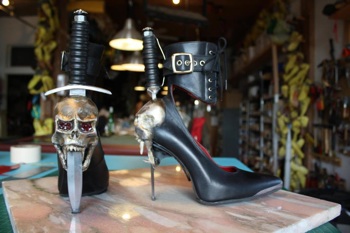 What was the most valuable thing you learned while studying in Theatre at York? What was the most challenging aspect or experience of training/studying at York?
What was the most valuable thing you learned while studying in Theatre at York? What was the most challenging aspect or experience of training/studying at York?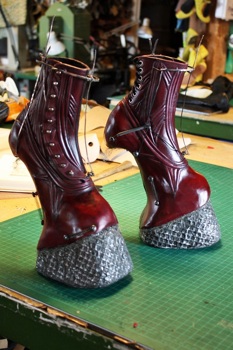 Do you have any advice or tips for York students just entering the dept.?
Do you have any advice or tips for York students just entering the dept.?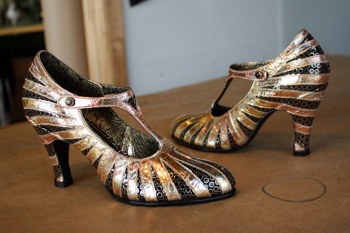 If you had the chance to go back and visit your younger self as you were beginning at York, what advice would you give yourself?
If you had the chance to go back and visit your younger self as you were beginning at York, what advice would you give yourself?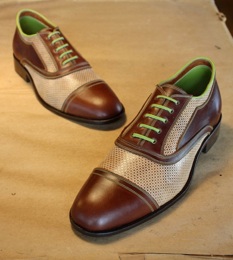 What surprised you about YOU by the end of your time at York?
What surprised you about YOU by the end of your time at York?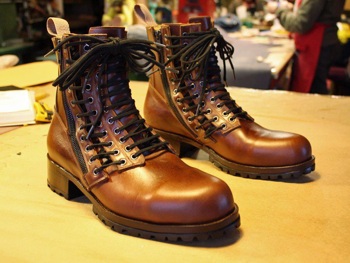 What did you NOT get taught at York that you wish you had been taught?
What did you NOT get taught at York that you wish you had been taught?